Recent Posts
-
Welcome Spring! 7 Fascinating Facts about the Season, plus, A Daytime PJ Quick Guide
2 weeks ago -
Beyond Hot Flashes: Discovering Unexpected Menopause Symptoms
1 month ago -
Everyone Loves Extra Time – Take advantage of every hour this Leap Day!
1 month ago -
Eat your heart out! Show Your Passion with a Heart-Shaped Inspired Valentine’s Dinner
2 months ago -
Time for YOU! PAMPERING tips from self-love January to take with you all year!
2 months ago -
Dreamy Delights: Our Sleepwear and Lingerie Holiday Gift Guide is LIVE!
4 months ago -
Julianna Rae Announces Giving Tuesday Beneficiary PLUS… the staff share their beloved Thanksgiving recipes!
4 months ago -
20 Thanksgiving themed front door decorating ideas to welcome family and friends
5 months ago -
The Ultimate Guide to Macy’s Thanksgiving Day Parade Balloons: History, Fun Facts, and More!
5 months ago -
The Bathrobe: 12 movies that chose this iconic clothing to set the scene…
6 months ago -
Silk: The Secret Ingredient for a Restful Night’s Sleep PLUS… Meet our new SILK Sleep Mask!
7 months ago -
Cherishing the Slow, Sweet Surrender of Summer
7 months ago -
We’re Seeing Double: August and September are Double Rewards Months with Julianna Rae’s “Top Drawer” Rewards Program!
8 months ago -
The Splendid Silk Camisole – A Perfect Cami for Day & Night!
9 months ago -
Our Flag, A Great American Icon PLUS… 3 American Flag Desserts for the Fourth!
9 months ago -
Get Inspired to GO… Spark your Wanderlust with 15 Fab Books and Podcasts
9 months ago -
A Father’s Day history plus We Love These Country Traditions…
10 months ago -
12 “MOMolicious” Gift Ideas for Mother’s Day
11 months ago -
Going Green: 5 Cleaning products you can make at home this Earth Day
11 months ago -
Woman’s History Month Proves All Her Time isn’t Spent in the Kitchen
1 year ago
Stay up all night with us… 6 Books you won’t be able to put down!
When we aren’t designing, packing and shipping the best silk undergarments and sleepwear northwest of Boston you will most likely find us with our noses in a good book. Reading is usually the topic of conversation around the lunch table at Julianna Rae and with the arrival of Summer and lighter schedules we have more time for it! What’s on our list?

Looking for a good book to read this summer? Check out our reading list compiled from our staff’s favorites, you just may find your new favorite…
Bangkok 8 – John Burdett
Reviewed by Cheryl Anne W, Technical Design
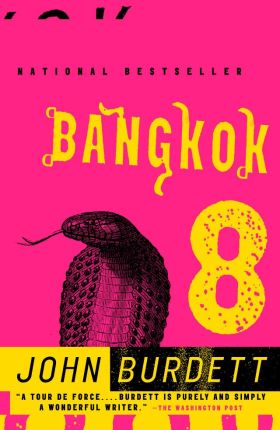
To call this another detective novel is to sell it short. This is a really sharp, quirky, sometimes dark, often humorous, philosophic thriller. It mirrors the city it takes place in, Bangkok, as bi-polar a city as one can get.
Like many detective novels, Bangkok 8 starts with an impossible murder: an American Marine sergeant is being trailed by two Thai detectives when his luxury Mercedes is suddenly attacked by cobras and pythons (Where did they come from? Why is a Marine driving such an expensive car? And who is the woman in the car who has disappeared after the arrival of the teeming snakes?) and killed before the watching detectives can save him.
From there it just gets more interesting. The central narrator is one of the detectives, Sonchai Jitpleecheep, a deeply Buddhist man who was raised in a whorehouse. The other detective is (was) his partner on the force who is accidentally killed at the scene of the crime by one of the cobras. Sonchai, who speaks of the genuine love for his partner with a beauty and frankness uncommon in typical buddy detective novels, has vowed to kill whoever put the snakes in the Mercedes and along the way solve the murder of the Marine.
What makes the book so interesting is the way Sonchai’s Buddhist views and meditations permeate his thoughts and actions and ultimately lead to his solving the mystery behind the murder. Through Sonchai, the author, John Burdett, upends the usual formula of logical cause and effect we expect to find in our detective novels.
But wait, there’s more! Did I mention the novel is bi-polar? Throw in the chaos and sin that characterizes Bangkok, a variety of crooked cops, a selection of prostitutes (retired as well as still practicing), befuddled FBI agents, gangster drug dealers, a few reputable but not quite honest jade merchants, and an exclusive surgeon specializing in sex-change operations, and Sonchai’s Buddhist morality and goodness become all that more invigorating.
From the back alleys of Bangkok to the serene meditations of a Buddhist detective, this book takes you on a roller coaster ride of sounds, scents and sensibility, all with great bursts of humor that make this essentially noir detective novel a truly joyful read.
H Is for Hawk – Helen Macdonald
Reviewed by Brette C, Analyst
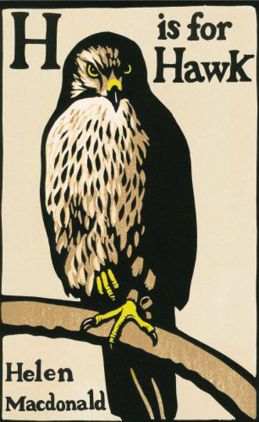 Hawks have a fierce reputation. They belong to the family of raptors, rooted in a word that means to seize or take forcefully. These birds are also prized for their speed, strength and grace.
Hawks have a fierce reputation. They belong to the family of raptors, rooted in a word that means to seize or take forcefully. These birds are also prized for their speed, strength and grace.
‘H Is for Hawk,’ a memoir by Helen Macdonald, shares many of these adjectives. It’s a powerful book that is tough to categorize, a deep and stunning read.
The book covers a lot of ground. It is a mix of history, nature, anguish and relationships, while also a thriller.
The book begins with a death. Macdonald, a falconer by training, is struggling in her own life with work and relationships when she gets a call that her father has died unexpectedly. Macdonald has a close bond with her father and she falls into a dark place.
That’s when Macdonald decides to train a goshawk, a rare type of ornery raptor that is described as “murderous.” She adopts a goshawk named Mabel. And as she goes through the challenging training process, she works through her grief in an utterly unique and page-turning journey. There are not many expert falconers and relatively few of these are women. Macdonald shares this fascinating field in detail, from the equipment used to the rush of emotions she experiences. Macdonald puts you right there with her and the hawk.
It’s not always an easy read, at times both frightening and touching, sometimes incredibly sad…
She also gives you an interesting look at falconers throughout history, most notably pulling from author T.H. White (The Sword in the Stone). Back in the mid 1900s, he become a recluse, trained a goshawk and wrote a book about it. And of course, there are moving scenes from her relationship with her father, a photojournalist who was a great supporter of her love for birds.
Ultimately, this memoir really is a story about connections, between Macdonald and Mabel, Macdonald and her father, the natural world and people.
H Is for Hawk won the Samuel Johnson prize for non-fiction, a prestigious prize in the UK, along with making numerous ‘best-of’ lists. It’s not always an easy read, at times both frightening and touching, sometimes incredibly sad. But it is a beautiful read, one to savor – if you can.
Out of Place: A Memoir – Edward W. Said
Reviewed by Marsh W, Photography Editor
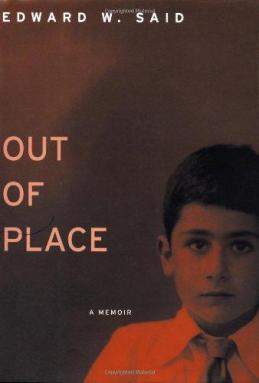 Out of Place, by Edward W. Said (1935 – 2003), is the Palestinian American scholar’s memoir of the years between 1935 and 1962, serving as “an unofficial personal record of those tumultuous years in the Middle East.”
Out of Place, by Edward W. Said (1935 – 2003), is the Palestinian American scholar’s memoir of the years between 1935 and 1962, serving as “an unofficial personal record of those tumultuous years in the Middle East.”
A rich tapestry unfolds. “Out of Place” takes on multiple meanings, within his family, schools, and various homes. He attributes the sensation in part to his parents, “two Palestinians with dramatically different backgrounds and temperaments living in colonial Cairo as members of a Christian minority. . .”
As much a journey through his mind as through any geography, the vivid and insightful writing exposes the reader to a history and culture, while at the same time forging a deeper connection that draws out our own memories and reflections.
The beauty of this book lies in the author’s humility and honesty…
The beauty of this book lies in the author’s humility and honesty, as Said includes meditations and perceptions that are left out of many personal essays in favor of excessive drama, humor, or fact. This introverted, analytical, and soft-spoken nature materializes from the onset:
“Much as I have no wish to hurt anyone’s feelings my first obligation has not been to be nice but to be true to my perhaps particular memories, experiences, and feelings. I, and only I, am responsible for what I recall and see, not individuals in the past who could not have seen what effect they might have had on me.”
“My ability to appear to be studying, reading or practicing the piano and at the same time to be thinking about something completely different and completely mine. . . was one of the features of my life that irritated teachers and parents but impressed me.”
And his deft wording honors the nature of others as well, for example his father:
“He managed to combine harshness, unreadable silence, and odd affection laced with surprising generosity which somehow never gave me enough to count on, and which until very recently I could neither dismiss as no longer threatening nor fully understand.”
Throughout the work, Said steps back to account for the role language played both in forming his memories and in committing them to the page, as he spoke both Arabic and English: “Everyone lives life in a given language.” The occasional departure from the narrative to explain the significance of a word or phrase or its emotional connotation imparts another dimension to his story.
The Palm-Wine Drinkard – Amos Tutuola
Reviewed by Sasha F, Concierge Service
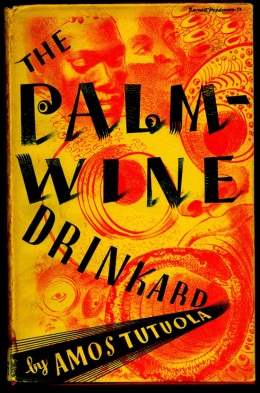 How can one not be intrigued by a book subtitled “and His Dead Palm-Wine Tapster in the Dead’s Town”? Don’t be fooled by its diminutive size – this slim little volume packs a wallop of a tale(s). I say “tale(s)” because it reads like a set of wonderful surreal vignettes all starring the same title character, the Palm Wine Drinkard.
How can one not be intrigued by a book subtitled “and His Dead Palm-Wine Tapster in the Dead’s Town”? Don’t be fooled by its diminutive size – this slim little volume packs a wallop of a tale(s). I say “tale(s)” because it reads like a set of wonderful surreal vignettes all starring the same title character, the Palm Wine Drinkard.
“The Palm Wine Drunkard” was first published in 1952, and was originally written in Yoruba English or Pidgin English. It is the first African novel published in English outside of Africa and the controversy surrounding the novel and its author is almost as fascinating as the novel itself. The author, Amos Tutuola, a tribesman of the Yoruba people in Nigeria, was a first generation literate who grew up in an oral culture and has managed to transfer a lot of the story-telling feeling to the page. The book was reviewed by so many Western publications when it first came out and over the next few years (with many of the reviews being unkind) that in 1975, the Africanist literary critic Bernth Lindfors produced an anthology of all the reviews of Tutuola’s work published to date. But this review is about the book itself, so I digress.
The plot is simple – it is told in the first person and by an unnamed man who is addicted to palm wine, a drink made from the fermented sap of the palm tree, and used in ceremonies throughout West Africa. When the narrator’s tapster (his employee who taps the palm tree to get the sap and prepares the wine) has an accident and dies, the desperate narrator has to go to Dead’s Town (that’s right, the town where the dead live!) to try to bring his tapster back. I believe you are now only on page 2 of this book and thus begins the narrator’s (and reader’s) journey through a magical and scary world of strange landscapes and supernatural beings. The narrator is tested in each chapter and each time outwits or outruns whatever trials or beings are put before him or around him.
The actual stories are supposedly based on common Yoruba folktales (and hence lies part of the controversy. Some hailed this book as ground breaking literature while others bitterly disagreed, saying it simply put oral traditions on paper. I say yes to the literary label but no one is asking me). The Pidgin English, while likely a nightmare to the poor editor, adds a dimension and cadence to the stories that you wouldn’t normally have the “privilege” of reading. Maybe the editor was overwhelmed and just gave up and if that was the case, I am glad as it adds energy and sense of place to the story enabling the reader to feel the raw beauty and drama of these fantastical stories – I felt like the stories were unfolding in my head. If only audio books were invented half a century ago – I would have loved to have heard the author read this book.
Thankfully, the book is still in print. I recommend finding it so you too can partake in the wonderful, crazy journey that is the “Palm Wine Drinkard.”
THIS GREAT UNKNOWING – Denise Levertov
Reviewed by Tito M, Inventory Management
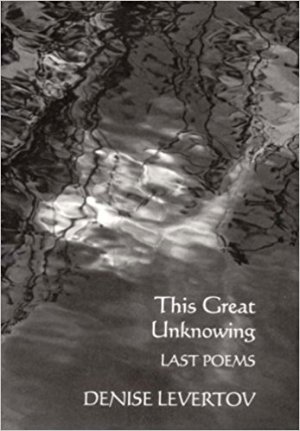 Summer: Light. Sand. Casual conversation and a cool drink. The only reflection beyond a simple, “Why can’t the entire year be like this?” might be the light off the breeze-whipped ripples on the ocean.
Summer: Light. Sand. Casual conversation and a cool drink. The only reflection beyond a simple, “Why can’t the entire year be like this?” might be the light off the breeze-whipped ripples on the ocean.
I have a cure for this; “This Great Unknowing: Last Poems,” the remarkable Denise Levertov’s final contribution to the canon of American poetry. Not that Ms. Levertov’s short collection of poetry and translation is dark or morose. On the contrary, the works are open, and actively searching for meaning and place, taking the reader on a journey that benefits from her wisdom and guidance. But it’s not the typical summer read. Then again, why pass a typical summer?
If you’re unfamiliar with Denise Levertov, she was, before her death in 1997, referred to by Kirkus Reviews as perhaps, “…the finest poet writing in English today.” Born in the UK, Levertov spent most of her writing years in the United States. She is known primarily as a spiritual and political poet but her writing spans the breadth of human experience. But her greatness lies less with her subject matter than with the sparse beauty of her language, her ability to connect with the reader and make experience come alive in print. Listen to her, in this excerpt from “First Love,” a poem she writes about encountering a convolvulus flower along the side of the road as a child:
It was a flower….
It looked at me, I looked
back, delight
filled me as if
I, not the flower,
were a flower and were brimful of rain.
And there was endlessness.
Perhaps through a lifetime what I’ve desired
has always been to return to that endless giving and receiving, the wholeness
of that attention.
that once in a lifetime
secret communion.
In this excerpt from “A Cryptic Sign,” Ms. Levertov concisely captures the stillness of an August day,
August. The woods are silent.
no sway of treetops, no skitter of squirrels,
no startled bird. Sky fragments
in rifts of canopy,
palest silken blue.
Nothing stirs. Blue sky, the passing cloud and the weight of heat we all know as August.
If you’re not a regular reader of poetry, it might be hard to imagine sitting by the pool working your way through metered verse. But Ms. Levertov’s writing just might make it all worthwhile. The poems are short, you can “get” them (for the most part), and they leave you feeling like you’ve come someplace you haven’t been before…and they can be fun!
We leave you with “Elephant Ears,” her humorous look at fashion, family, and courage…of sorts.
ELEPHANT EARS
I’ve given up wearing earrings.
Like my mother’s, my ears are large –
and mine are lopsided. Now, with age,
the lobes show a crease, and seem to droop
like a Buddah’s. But Buddhist tradition
links such big ears to wisdom –
should that console me? My big-eared mother,
although not foolish, was not so much wise
as ardent, responsive, eager to learn.
At the age I am now, she still wore her various pairs
of beautiful earrings with confidence,
and they became her. Perhaps that eclat
was her wisdom – for now, and maybe forever,
a wisdom beyond my reach.
Should I call upon Buddha, on Ganesh,
upon that part of my mother
which lives in me, for enlightenment?
For the chutzpa to dangle jewels
from long and uneven lobes?
_________________________________________________
The excerpts from “First Love”, and “A Cryptic Sign” and the poem “Elephant Ears” are quoted from, This Great Unknowing: Last Poems, by Denise Levertov. Copyright 1999 by The Denise Levertov Literary Trust, Paul A. Lacey and Valerie Trueblood Rapport, Co-Trustees. Published by New Direction Publishing Corporation, 80 Eighth Avenue, New York, NY 10011
THE HIDDEN LIFE OF TREES – By Peter Wohlleben
Reviewed by Daria M, Product Development
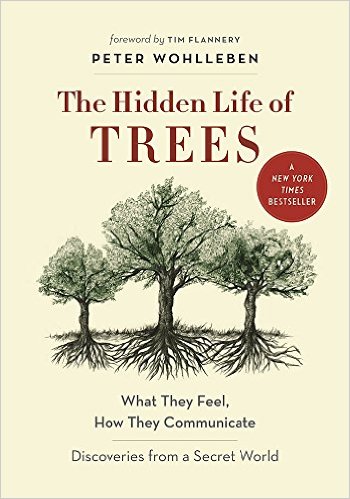 German forester Peter Wohlleben will challenge your thinking about the natural world. Presenting the forest and trees as kingdom and kings he reveals a magic to trees that is hidden from our view. Through observation and science, Wohllenben makes the case that trees aren’t just silent observers of the earth but, instead, active participants in a struggle for their own survival and the survival of their surroundings.
German forester Peter Wohlleben will challenge your thinking about the natural world. Presenting the forest and trees as kingdom and kings he reveals a magic to trees that is hidden from our view. Through observation and science, Wohllenben makes the case that trees aren’t just silent observers of the earth but, instead, active participants in a struggle for their own survival and the survival of their surroundings.
Wohlleben uses science to back up his theories but this book is far from being a science or botany book. Written in conversational style and with a warmth that glows with themes of family, nurturing, and community, Wohlleben does a great job explaining the complex processes of nature. With only 288 pages, The Hidden Life of Trees may not be the longest book you read this summer but its depth about the natural world will leave you with a desire to connect to nature.
